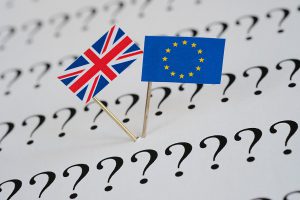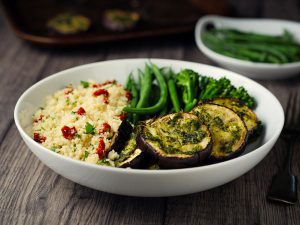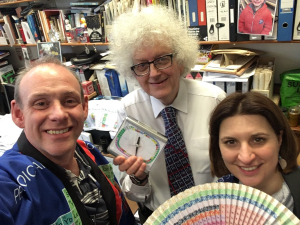
February 5, 2019, by Liz Goodwin
University News Review — January 2019
The beginning of 2019 saw University of Nottingham stories in the news…
New Year, new you!
 A new study, which looked at 28 top-ranking universities to see which offered the best facilities for health and fitness, found the University of Nottingham the best in the UK.
A new study, which looked at 28 top-ranking universities to see which offered the best facilities for health and fitness, found the University of Nottingham the best in the UK.
iNews reported that the University topped the list for how they support healthy lifestyles, such as the cost of a gym membership and the number of yoga classes. MyStudentHalls, which compiled the rankings, also looked at the number of meditation classes, mindfulness resources and societies for tee-total students.
Edinburgh University also scored highly but was pipped to the top due to the breadth of facilities researchers felt Nottingham offered under its top tier fitness membership.
Dan Roberts, founder and managing director of MyStudentHalls, said student attitudes were changing and that demand had risen for quieter, alcohol-free accommodation. “For so long, student culture has been synonymous with drinking and partying. But it’s clear that a wider shift towards wellness is reflective in the ways that students are spending their money and free time, as well as how they eat, sleep and live.”
International Year of the Periodic Table
 2019 has been named the International Year of the Periodic Table, and launched on January 29 at a ceremony in Paris.
2019 has been named the International Year of the Periodic Table, and launched on January 29 at a ceremony in Paris.
In celebration of the 150th anniversary of the creation of the periodic table, the University revealed some exciting plans to celebrate the scientific milestone, including creating a Nottingham periodic table featuring recognisable landmarks, sayings and people from the city.
The idea to celebrate the anniversary was sparked by Professor of Chemistry Sir Martyn Poliakoff, who since 2008 teamed up with video journalist Brady Haran to start the Periodic Table of Videos. Since the first video was posted the team has filmed experiments for many of the elements, and the hugely popular videos have made Sir Martyn and his team YouTube stars with millions of fans worldwide.
The University is asking people to help with the Nottingham version of the periodic table by providing their suggestion of Nottingham related replacements for the chemical elements. For example…. Fr – Friar Tuck, Pa – Paul Smith and Eu – ‘Ey Up Mi Duck.’ The form to send in suggestions can be found here.
HRT tablets linked to higher blood clot risk
 The Telegraph, Guardian, Daily Mail and BBC all reported on a study which revealed women who use certain types of hormone replacement therapy (HRT) are at a higher risk of developing potentially life-threatening blood clots.
The Telegraph, Guardian, Daily Mail and BBC all reported on a study which revealed women who use certain types of hormone replacement therapy (HRT) are at a higher risk of developing potentially life-threatening blood clots.
Dr Yana Vinogradova of the School of Medicine undertook the research with University colleagues, and the experts hope the results will help to provide clearer, detailed information for patients and doctors about the relative risks of blood clots for all HRT treatments and enable them to make good treatment choices.
Dr Vinogradova said: “Our findings offer particularly important information for women, who require HRT treatment and are already at increased risk of developing blood clots.”
Brexit: What happens next?
 Brexit continued to dominate conversations throughout January, and University of Nottingham academics spoke in both professional and personal contexts.
Brexit continued to dominate conversations throughout January, and University of Nottingham academics spoke in both professional and personal contexts.
ITV Central News went to Beeston and met with Caitlin Milazzo, Associate Professor in the School of Politics and International Relations, to take questions from members of the public ahead of Parliament’s vote on Theresa May’s Brexit deal.
Caitlin attempted to predict what would happen if the Prime Minister didn’t manage to negotiate a Brexit deal. She also took questions on why the decision hasn’t been put back to the people; what exactly was included in Mrs May’s deal; and what will happen over the Northern Ireland border?
She concluded: “It turns out that Brexit is very complicated and that no one can actually agree what it means.”
In another story, BBC1 East Midlands Today spoke to one family in Nottinghamshire where the parents of British children have been told to ask for permission to keep living here after Brexit. As of January 21, EU nationals can apply for a ‘settled status.’ Denis Schluppeck, is a neuroscientist at the University who grew up in Germany and kept his German nationality, and his wife Ileana, is an intensive care doctor at QMC and has lived here for more than 20 years. Both now need to apply to settle in Britain.
Ileana talked to the BBC’s Social Affairs Correspondent Jeremy Ball to explain how upset the situation has made her feel. “It was a real kick in the teeth for us,” she said.
Filming on campus
 Veganuary… many are staying vegan beyond January
Veganuary… many are staying vegan beyond January
These are interesting times for non-meat eaters. Always a minority, they are now seeing loads of new products on menus and supermarket shelves. Their worries about meat are now moving into the mainstream and young people in particular are eating less meat. A fifth of millennials – the people born in the 80s and 90s – say they are now following a low-meat diet.
Bob Walker of BBC Radio 4’s You and Yours visits Henderson’s Restaurant at the University where the menu is gluten free and 97 per cent vegan, with vegetarian options. It’s next to the Students’ Union and is very popular.
It’s clear that the growing demand for meat-free alternatives here is reflected across this age group. Bob talks to young people who are eating less meat, and asks if it’s a fad or here to stay; and asks how farmers are planning to cater for them now and in the future.
No comments yet, fill out a comment to be the first


Leave a Reply